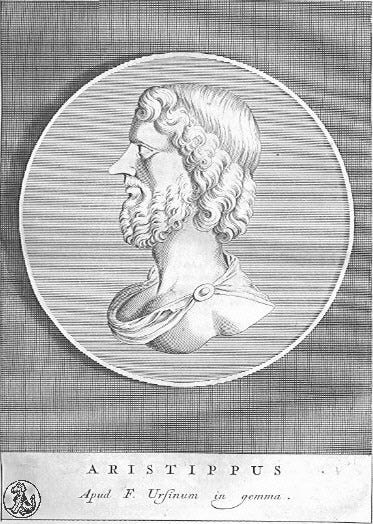Profiles in skepticism: the Cyrenaics
The philosophers of pleasure, turns out, were also quite skeptical
The Cyrenaics were the original hedonists, far more so than their more successful later competitors, the Epicureans. Their creed was that pleasure is the only true good, and by pleasure they meant physical and immediate. No delayed gratification for them, and no fancy intellectual stuff either. The Cyrenaics were the true sex, drugs, and rock ’n’ roll practitioners of the ancient world!
Yet Richard Bett, in his chapter in the collection Skepticism: From Antiquity to Present, considers the possibility that the Cyreanics were also skeptic, at least when it came to their epistemology, their theory of knowledge.
Sextus Empiricus, the major exponent of the Pyrrhonist school (well, other than Pyrrhus himself!) disagreed. He pointed out, to begin with, that the goal of a Cyrenaic life was pleasure, while the goal of a Skeptic life is ataraxia, freedom from worry. But that, frankly, is neither here nor there. Ataraxia is no more inherently a skeptical goal than virtue or pleasure. Just consider that the Cicero, a prominent member of the other school of Greco-Roman skepticism, the Academics, thought that the goal of is to live virtuously, similar to what the Stoics also maintained.
A second reason Sextus argued that the Cyrenaics were not skeptics is that they thought that objects in the world are inherently unknowable. Pyrrhonists didn’t go that far, limiting themselves to say that they did not know whether objects are knowable or unknowable. To come down firmly on one side or the other of the question would be “dogmatic.” [1] Then again, Pyrrhonism is not the only way to be a skeptic, and to deny that knowledge of objects as they really are is possible would strike many philosophers as a considerably skeptical stance.
Let’s take a closer look at what the Cyrenaics actually thought. Cicero, in Academica II.76, tells us that they “do not know what has which color or which sound, but only sense that they are affected in a certain way.” That is, the Cyrenaics acknowledged that we have certain sense-impressions, like that of color or sound, but that these don’t necessarily tell us anything about the objects that generate such impressions. I may be looking at a red chair, or listening to a bird sing, but that doesn’t give me access to either the chair or the bird as they are in themselves.
To put it more clearly: we don’t have access to objects in the world, we only have access to our own subjective experiences of those objects. This is a fairly modern view. A neuroscientist may readily agree, reminding us that our brains are, in an important sense, virtual reality simulators that reconstruct external objects on the basis of sense-data. That we perceive objects directly is a powerful illusion, but an illusion nonetheless.
One reason to think that the Cyrenaics were not radical skeptics but rather epistemologically close to Academics like Cicero is that they did not doubt the existence of an external world. They just thought that we don’t perceive it, but rather infer its existence from our sense-impressions. In other words, they were making an epistemological, not an ontological point.
Interestingly, the Cyrenaics—according to Sextus Empiricus—seem to have been skeptical also of the sense-impressions of other people, a position that Bett reasonably says anticipates one of the most celebrated modern philosophical problems: skepticism about other minds. As he puts it: “Sextus says that according to the Cyrenaics, ‘each person grasps the sense-impressions that is his own,’ but that since we do not grasp each other’s sense-impressions, ‘it is rash to say that what appears a certain way to me also appears that way to the next person.’” (p. 78).
The problem of other minds consists in answering the question of how, exactly, do I know that mine is not the only mind in the universe? The thought may seem rather solipsistic, or at the very least narcissistic, but the question is a surprisingly difficult one. I only have indirect evidence of other people’s having minds, essentially based on an argument from similitude. Since other people appear to be constituted as I am, with a brain, a heart, two eyes, and so forth, I can infer that they also have a mind. But that inference certainly doesn’t amount to knowledge in any strong sense of the term. That said, just as they don’t actually deny the existence of an external world, the Cyrenaics also don’t seem to doubt the existence of other minds—and are therefore not inclined toward solipsism. They simply ask what is arguably the most important question we can pose about anything: how do we know?
[Next in this series: Pyrrho of Elis.]
_____
[1] In ancient Greek “dogma” meant opinion. Sextus was saying that a true skeptic does not affirm any specific opinion, because its opposite may also be reasonably defended. That’s why suspending judgment is the wise thing to do.





A better category to describe the actions of many who live in an abundantly prosperous world, and have the means to act with this one goal in mind every moment of the day.
"That we perceive objects directly is a powerful illusion, but an illusion nonetheless."
I disagree with this use of the word 'illsuison'. It fhe contructed 'image' in are brain is representation of something 'outthere' it's not an illusion.
If you see a truck speeding past, it's best not to step in front of it under the illusion it is an 'illusion'.
Some theoretical physicist have said 'time is an illusion'. This seems silly to me. Just because it may be built on top of some deeper structure doesn't make it an 'illusion'. A house is not an inllusion because it's made of bricks and a brick is not illusiond because it's made of molecules. If somebody throws a brick at you duck.